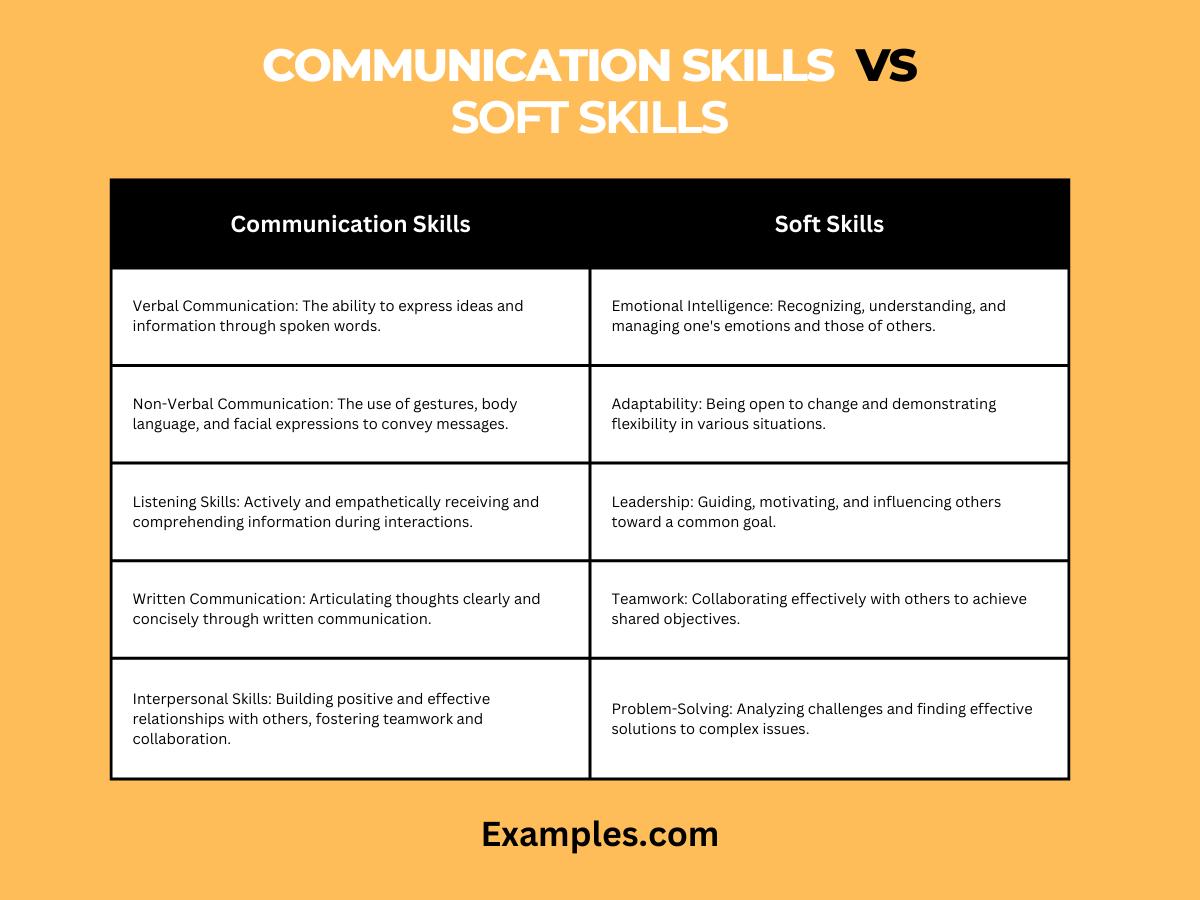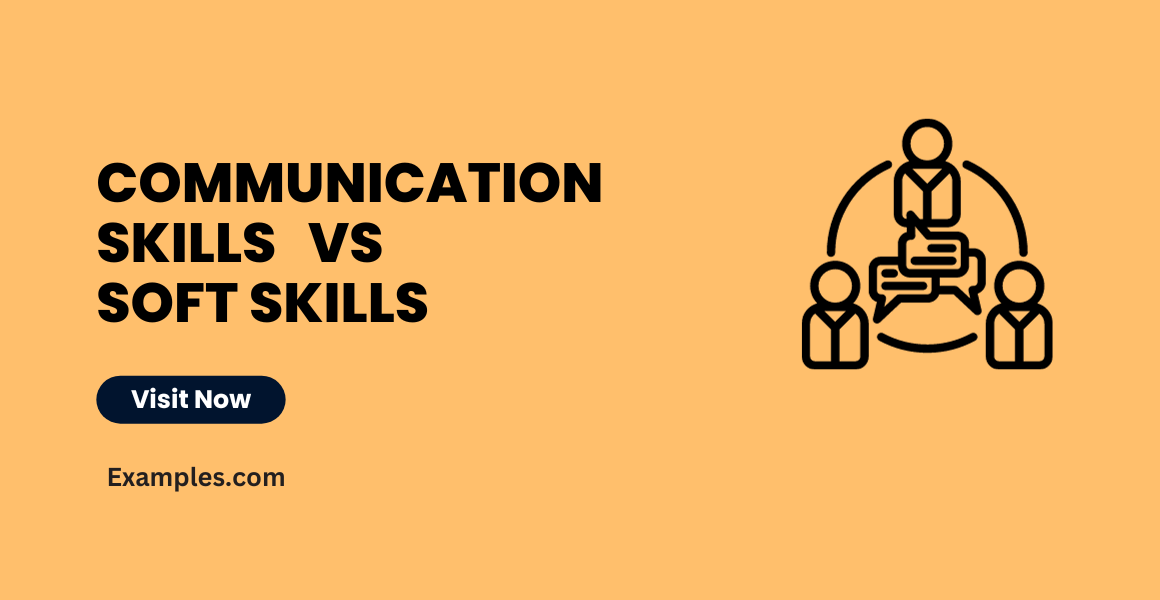Communication Skills vs Soft Skills – 19+ Examples
Embark on a comprehensive journey exploring the nuances of Communication Skills vs Soft Skills. This detailed guide unravels the intricacies, providing insights into their distinct roles and practical examples for a holistic understanding. Delve into the world of effective communication and soft skills, with a spotlight on real-life scenarios. From workplace dynamics to personal growth, this guide equips you with the expertise needed to navigate these crucial aspects, ensuring success in both professional and interpersonal spheres.
Difference between Communication Skills and Soft Skills
In the ever-evolving landscape of professional development, understanding the distinctions between communication skills and soft skills is crucial. This guide delves into their definitions, significance across various contexts, and practical applications in the workplace, nursing, interviews, and performance reviews.

| Aspect | Communication Skills | Soft Skills |
|---|---|---|
| Definition | Encompasses verbal, non-verbal, and written communication methods. | Encompasses a broad set of personal attributes and interpersonal abilities. |
| Application | Relevant in various contexts, including business, education, and daily interactions. | Applicable across diverse settings, enhancing collaboration and interpersonal relationships. |
| Key Components | Involves verbal articulation, active listening, adaptability, and effective written communication. | Encompasses attributes like emotional intelligence, teamwork, adaptability, and leadership. |
| Examples | Crafting effective emails, delivering presentations, and active participation in discussions. | Team collaboration, conflict resolution, leadership, and displaying empathy in various situations. |
| Importance in Business | Vital for clear communication, negotiations, and fostering professional relationships. | Crucial for building a positive workplace culture, effective teamwork, and leadership development. |
| Skill Development Strategies | Develop active listening, refine written communication, and adapt communication style based on the audience. | Enhance emotional intelligence, cultivate teamwork, and refine leadership and conflict resolution skills. |
20 Examples of Communication Examples VS Soft Skills
Enhance your professional toolkit with our curated list of 20 exemplary Communication Skills vs Soft Skills examples. From verbal proficiency to emotional intelligence, each skill is a cornerstone for success in various settings. Dive into this comprehensive guide that not only provides practical examples but also offers insights on how to communicate effectively and master the art of soft skills in diverse scenarios.
Communication Skills Examples
- Active Listening: In a team meeting, practice active listening by fully focusing on your colleague’s perspective before responding.
- Emotional Intelligence: Demonstrate emotional intelligence by recognizing and appropriately responding to the emotions of your team members during challenging projects.
- Written Communication: Crafting concise and clear emails showcases your written communication skills, fostering efficient workplace correspondence.
- Adaptability: During changes in project scope, showcase adaptability by swiftly adjusting your strategy to meet evolving requirements.
- Leadership: In a group project, exhibit leadership by coordinating tasks, motivating team members, and ensuring project goals are met.
- Teamwork: Collaborate seamlessly in a cross-functional team, demonstrating effective teamwork through shared responsibilities and mutual support.
- Problem-Solving: Address challenges by employing problem-solving skills, analysing issues, and implementing innovative solutions for optimal outcomes.
- Interpersonal Skills: Building positive relationships with colleagues is a testament to strong interpersonal skills, fostering a harmonious work environment.
- Time Management: Completing tasks efficiently and meeting deadlines reflects effective time management skills, enhancing overall productivity.
- Conflict Resolution: Resolve conflicts diplomatically, finding common ground and facilitating open communication among conflicting parties.
Soft Skills Examples
- Emotional Intelligence: Navigate workplace dynamics by recognizing and managing emotions, fostering a positive and supportive atmosphere.
- Adaptability: Thrive in changing environments by embracing new challenges and adjusting strategies swiftly for optimal outcomes.
- Leadership: Inspire and guide team members toward common goals, showcasing effective decision-making and motivational abilities.
- Collaboration: Foster teamwork by actively engaging with colleagues, sharing responsibilities, and achieving collective objectives.
- Problem-Solving: Tackle challenges strategically, analysing issues and implementing innovative solutions for efficient resolution.
- Time Management: Optimize productivity by prioritizing tasks, setting realistic goals, and consistently meeting deadlines.
- Communication: Express ideas clearly and concisely, actively listen, and adapt communication styles to suit diverse audiences.
- Adaptability: Incorporate feedback gracefully, demonstrating a willingness to learn and evolve for continuous improvement.
- Conflict Resolution: Resolve conflicts diplomatically, finding common ground and facilitating open communication among conflicting parties.
- Negotiation Skills: Negotiate effectively by understanding the needs of all parties involved and crafting agreements aligned with overarching objectives.
Comparison Between Communication Skills and Soft Skills
| Aspect | Communication Skills | Soft Skills |
|---|---|---|
| Definition | Encompass verbal, non-verbal, and written abilities crucial for effective interaction. | Broad set of interpersonal, communication, and behavioural attributes that facilitate positive interactions. |
| Importance in Business | Vital for clear workplace communication, enhancing collaboration and understanding. | Essential for building a positive work culture, fostering teamwork, and effective leadership. |
| In Nursing | Critical for conveying information to patients and colleagues, ensuring optimal care. | Crucial for empathy, teamwork, and managing stress in the high-pressure healthcare environment. |
| At the Workplace | Enhances team dynamics, resolves conflicts, and ensures efficient task execution. | Nurtures a positive work environment, supports adaptability, and encourages open communication. |
| In Interviews | Impresses employers by showcasing effective communication, listening, and interpersonal skills. | Demonstrates a candidate’s adaptability, problem-solving abilities, and overall positive attitude. |
| For Performance Reviews | Aids in constructive feedback, ensuring professional growth and enhanced collaboration. | Influences career advancement by showcasing leadership potential, adaptability, and teamwork. |
Communication Skills vs Soft Skills in Business
Navigate the intricate landscape of business interactions with a deep dive into the nuances of communication skills vs soft skills. This guide equips professionals with insights into effective communication strategies and the broader soft skills spectrum. Uncover the key distinctions and master the art of fostering collaboration, adaptability, and leadership within a business context.
- Effective Email Etiquette: Enhance professional communication by using clear subject lines and concise language, ensuring emails are easily understood and responded to.
- Leadership in Meetings: Exhibit leadership by steering meetings effectively, encouraging participation, and guiding discussions toward constructive outcomes.
- Conflict Resolution Strategies: In business conflicts, employ active listening and mediation skills to resolve issues amicably, fostering a harmonious work environment.
- Adaptability to Change: Demonstrate adaptability by proactively adjusting strategies and processes in response to changing market dynamics or organizational shifts.
- Customer Relationship Building: Build strong customer relationships by showcasing empathy, active listening, and effective communication to meet client needs.
- Cross-Functional Collaboration: Facilitate cross-functional collaboration by effectively communicating project goals, expectations, and fostering teamwork among diverse teams.
- Strategic Negotiation: Negotiate strategically in business deals by understanding the needs of all parties involved and crafting agreements that align with overall objectives.
- Innovation Pitching: Present innovative ideas persuasively, combining creativity with articulate communication to gain support for new initiatives.
- Time Management for Projects: Exhibit time management skills by creating realistic project timelines, allocating resources efficiently, and meeting deadlines consistently.
- Client Presentation Skills: Deliver compelling client presentations by tailoring information to the audience, utilizing visuals, and addressing potential concerns proactively.
Communication Skills vs Soft Skills in Nursing
In the healthcare realm, effective communication and soft skills are paramount for nursing professionals. This guide delves into the specific requirements of nursing, emphasizing the importance of compassionate communication, emotional intelligence, and teamwork. Explore how these skills contribute to optimal patient care and collaborative healthcare environments.
- Empathetic Bedside Manner: Show empathy in patient interactions, offering emotional support and fostering a sense of comfort and trust.
- Multidisciplinary Collaboration: Work seamlessly with diverse healthcare professionals, ensuring effective communication and shared goals for patient care.
- Patient Education: Communicate complex medical information in a clear and accessible manner, empowering patients to make informed decisions about their health.
- Stress Management in Critical Situations: Maintain composure during high-stress situations, ensuring swift and effective decision-making for patient well-being.
- Cultural Competence: Demonstrate cultural competence by adapting communication styles to respect diverse patient backgrounds, ensuring inclusive and patient-centred care.
- Effective Handover Communication: Conduct precise and thorough handovers between nursing shifts, ensuring continuity of care and patient safety.
- De-escalation Techniques: Use de-escalation strategies during challenging patient interactions, diffusing tension and promoting a calm healthcare environment.
- Family Communication: Communicate effectively with patient families, providing updates and involving them in care decisions for a collaborative healthcare approach.
- Conflict Resolution in Team Settings: Resolve conflicts among healthcare team members swiftly, maintaining a positive and collaborative atmosphere for optimal patient outcomes.
- End-of-Life Conversations: Approach end-of-life discussions with sensitivity, providing support, information, and facilitating open communication with patients and their families.
Is Communication a Technical or Soft Skill?
In navigating the landscape of skills, understanding the categorization of communication is pivotal. While communication is inherently a soft skill, it often encompasses technical facets, especially in specialized fields. This guide delves into the nuances of why communication is primarily considered a soft skill, examining its dynamic interplay with technical elements.
How is Communication Considered a Soft Skill?
Communication, often hailed as a soft skill, revolves around interpersonal interactions, emotional intelligence, and the ability to convey messages effectively. This comprehensive exploration unravels how communication, rooted in human connection, transcends mere technical proficiency, making it a cornerstone of successful personal and professional relationships.
In summary, this comprehensive guide illuminates the distinctions between communication skills and soft skills, providing real-world examples and practical insights. Navigating the realms of effective communication and cultivating soft skills is not just a professional necessity but a key to fostering collaborative environments and personal growth. Empower yourself with the knowledge and examples shared to thrive in diverse contexts, both in the workplace and beyond.



